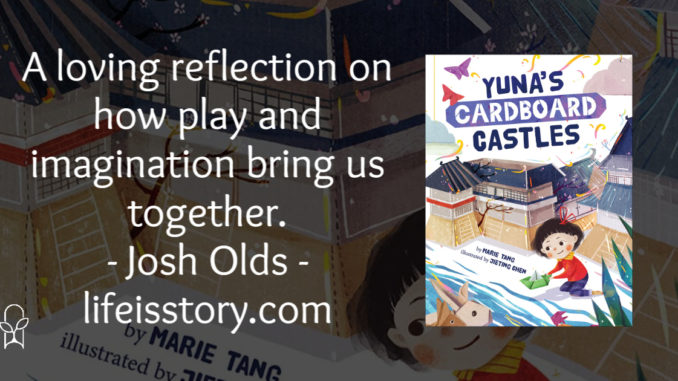
Published by Beaming Books on November 29, 2022
Genres: Children's
Buy on Amazon
Goodreads

Fold, fit, tuck . . .
Yuna and her family have just moved to the United States, and she doesn't speak English yet. At first, her attempts to catch the attention of the neighborhood kids get lost in translation, but when she shows that she can do something very special with paper, a whole new world unfolds.
Marie Tang and Jieting Chen have brought Yuna's origami creations to life in this whimsical, magical picture book, where the language of play can bridge the language barrier and build new friendships. Back matter includes information about the origin of origami and instructions for kids to fold their own paper boat.
Moving to a new place can be scary. Moving to a new place where everyone is different from you and doesn’t speak the same language as you is even scarier. Yuna and her family have just moved to the United States from Japan and she doesn’t speak English yet. How is she going to make new friends? Yuna’s Cardboard Castles explores the way people—young children especially—can learn to relate to one another despite language and cultural barriers. It’s a story about grieving the loss of something, while figuring out how to keep it a part of you as you move forward. It’s a story of immigration. It’s a story of cultural identity. It’s a story of how the language of play transcends any verbal or written language.
Yuna isn’t sure where she fits in her new home. The houses are different. The city is different. The language is different. But through play—particularly through Yuna’s origami—Yuna and her new friends concoct a whole world through their shared imagination. Illustrator Jieting Chen wows with amazing colors, blending origami creations with imagination with just a splash of reality thrown in. Just like Yuna’s origami balls, Chen breathes life and depth into the book, causing readers to linger and explore the page even after they’ve read the words.
Marie Tang writes from personal experience, having been born in Hong Kong before coming to America as a child. In the afterword of Yuna’s Cardboard Castles, she writes that it was through creating imaginary worlds with origami paper and cardboard moving boxes that she gained her first friends in her new home. The fact that experience stuck with her and impacted her so much that it became this book is a testament to the power of play and imagination in building friendships and making others feel at home.
Yuna’s Cardboard Castles is a loving reflection on how play and imagination bring us together. I’m particularly excited to see Asian stories told by Asian creators. Yuna’s (and Tang’s) story is the story of so many Asian immigrants who find themselves in unfamiliar spaces. For years, the message to immigrants has been assimilation. Tang and Chen reject that, using the cultural expression of origami as a way of tying together Yuna’s old home with her new one.
